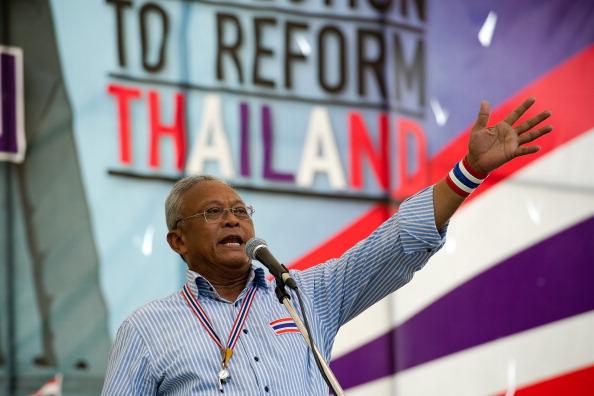BANGKOK—Thailand’s prime minister invoked an emergency law Monday after demonstrators seeking to remove her from office occupied parts of the finance and foreign ministries.
Prime Minister Yingluck Shinawatra announced that the Internal Security Act would cover all of Bangkok and large parts of the surrounding areas. Three especially sensitive districts of the capital have been under the law since August, when there were early signs of political unrest.
The law authorizes officials to seal off roads, take action against security threats, impose curfews, and ban the use of electronic devices in designated areas. Peaceful rallies are allowed under the law.
“It is necessary for the government to enforce the law,” Yingluck said on national television.
“But I would like to insist that the government will strictly not use any violence against people.”
Protesters swarmed into the two government ministries earlier Monday, overrunning several buildings and cutting electricity in an escalating campaign to topple Yingluck’s government.
Ongoing Protests
Various rallies have been ongoing in Bangkok for much of November, initially to protest an amnesty bill that the Yingluck administration tried to pass that protesters said would allow her billionaire brother Thaksin to avoid criminal charges.
The bill was quashed by public uproar but demonstrations continued and shifted their focus to the toppling Yingluck’s administration.
Her brother was Thailand’s prime minister from 2001 to 2006 when he was ousted by a military coup that came on the heels of mass demonstrations by yellow-shirt protesters who were mostly middle-class Bangkok residents and royalists. He has lived in a self-imposed exile since 2008 to avoid criminal charges.
Despite not being in the country, Thaksin has a large rural support base that voted in his sister and the pro-Thaksin Pheu Thai Party into power in 2011.
Thaksin also has strong support from the red-shirt movement, which is predominantly made up of rural poor from the north and northeast of Thailand. In the past the red shirts have been involved in violent street protests, most notably during April and May 2010 when they occupied a commercial area of Bangkok. By the time the military had forcefully cleared the red shirts from their barricaded camp over 90 people had been killed and scores of buildings were set ablaze.
In the show of support for the Shinawatras and the beleaguered government approximately 40,000 red shirts remain in the city after a counter pro-government rally was held at a sports stadium Sunday.
Opposition’s Boldest Acts
The incursions into the finance and foreign ministries were the boldest acts yet in opposition-led protests that started last month. They highlighted the movement’s new strategy of paralyzing the government by forcing civil servants to stop working.
The opposition Democrat Party, which is spearheading the protests and has lost to Thaksin-backed parties in every election since 2001, also plans to challenge the government Tuesday with a parliamentary no-confidence debate.
The law will cover the city’s international airports. In 2008, anti-Thaksin demonstrators occupied Bangkok’s two airports for a week after taking over the prime minister’s office for three months.
Protest leader Suthep Thaugsuban led the crowd at the Finance Ministry on a day when protesters fanned out to 13 locations across Bangkok, raising concerns of violence in the country’s ongoing political crisis, which has revolved around Thaksin for years.
“Go up to every floor, go into every room, but do not destroy anything,” Suthep told the crowd before he entered the ministry and held a meeting in its conference room.
“Make them see this is people’s power!” said Suthep, a former deputy prime minister and opposition lawmaker.
Protesters sang, danced, and blew noisy whistles in the hallways as part of their “whistle-blowing” campaign against the government. One group cut power at the Budget Bureau to pressure the agency to stop funding government projects.
Police made no immediate move to oust them.
Journalist Assaulted
During Monday’s protests a German journalist, Nick Nostitz, 43, was accused of being pro-red shirt and was attacked by protesters.
Nostitz has written extensively on Thailand’s political crisis. He was assaulted after being singled out by one of the protest leaders, former Democrat Parliament Member Chumphol Julsai, according to information from the Foreign Correspondents Club of Thailand’s (FCCT) Facebook page.
“[Former] Democrat MP Chumphol pointed him out from the protest stage calling him a ‘red shirt journalist’ and urged the crowd to kick him out,” the FCCT’s Facebook page stated.
“[Nostitz] said it was a matter of seconds before the first fists hit him. He is filing charges and this rules [him out] of covering the yellow protests from now on. He was then denounced on Thai TV by a member of the Thai press corps,” the FCCT’s message continued.
The Associated Press contributed to this report.



